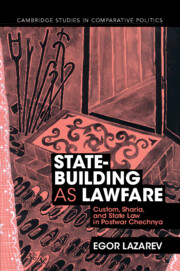Book contents
- State-Building as Lawfare
- Cambridge Studies in Comparative Politics
- State-Building as Lawfare
- Copyright page
- Dedication
- Contents
- Figures and Tables
- Acknowledgments
- Introduction
- Part I Theory and Ethnography
- Part II Lawfare and Political Order
- 3 The Chechen Way
- 4 “There Are No Camels in Chechnya!”
- 5 “We Will Use Every Resource!”
- Part III Lawfare and Social Order
- References
- Index
- Other Books in the Series (continued from page ii)
5 - “We Will Use Every Resource!”
Jurisdictional Politics in Postwar Chechnya
from Part II - Lawfare and Political Order
Published online by Cambridge University Press: 02 February 2023
- State-Building as Lawfare
- Cambridge Studies in Comparative Politics
- State-Building as Lawfare
- Copyright page
- Dedication
- Contents
- Figures and Tables
- Acknowledgments
- Introduction
- Part I Theory and Ethnography
- Part II Lawfare and Political Order
- 3 The Chechen Way
- 4 “There Are No Camels in Chechnya!”
- 5 “We Will Use Every Resource!”
- Part III Lawfare and Social Order
- References
- Index
- Other Books in the Series (continued from page ii)
Summary
This chapter investigates the instrumental use of non-state legal systems in postwar Chechnya by the Kremlin-imposed ruler Ramzan Kadyrov. It argues that Kadyrov has been promoting legal pluralism in order to win legitimacy among segments of the population, increase his autonomy from the federal center, and better accommodate former rebels, who became state bureaucrats in the postwar period. This chapter casts doubt on alternative explanations. The evidence that Ramzan Kadyrov’s policy towards non-state legal systems is radically different from the policy of his father, who was a cleric and traditionalist, yet strengthened Russian state law and abstained from promoting Sharia and custom, is troubling for the path-dependence argument. Meanwhile, the narrative of how Ramzan Kadyrov was able to effectively “cancel” the customs of bride kidnapping and blood revenge – the most notorious Chechen customs – indicates that the state capacity explanation is also limited. The second part of the chapter compares lawfare in Kadyrov’s Chechnya with legal politics in the neighboring regions of Ingushetia and Dagestan. These comparisons further support the idea that local leaders in the North Caucasus promote non-state legal systems not because of ideological commitments, but as a way to ensure their political survival.
Keywords
- Type
- Chapter
- Information
- State-Building as LawfareCustom, Sharia, and State Law in Postwar Chechnya, pp. 142 - 172Publisher: Cambridge University PressPrint publication year: 2023

